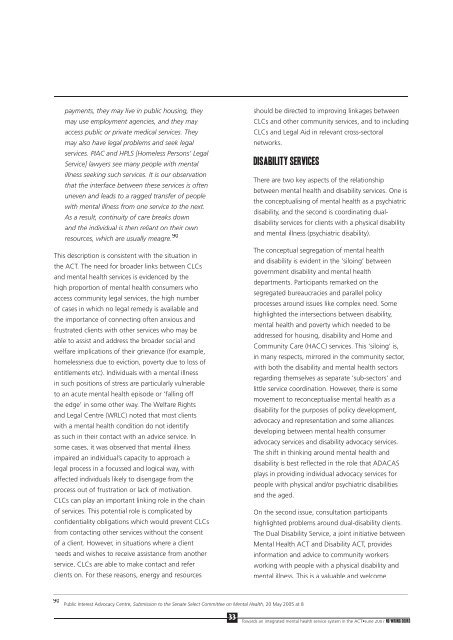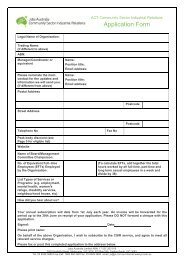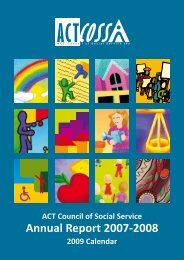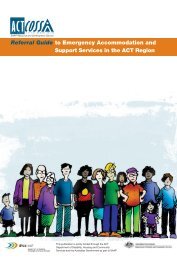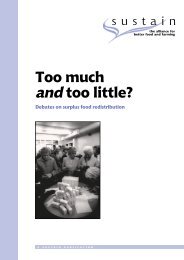actcoss text final.indd - ACT Council of Social Service
actcoss text final.indd - ACT Council of Social Service
actcoss text final.indd - ACT Council of Social Service
You also want an ePaper? Increase the reach of your titles
YUMPU automatically turns print PDFs into web optimized ePapers that Google loves.
payments, they may live in public housing, they<br />
may use employment agencies, and they may<br />
access public or private medical services. They<br />
may also have legal problems and seek legal<br />
services. PIAC and HPLS [Homeless Persons’ Legal<br />
<strong>Service</strong>] lawyers see many people with mental<br />
illness seeking such services. It is our observation<br />
that the interface between these services is <strong>of</strong>ten<br />
uneven and leads to a ragged transfer <strong>of</strong> people<br />
with mental illness from one service to the next.<br />
As a result, continuity <strong>of</strong> care breaks down<br />
and the individual is then reliant on their own<br />
resources, which are usually meagre. 90<br />
This description is consistent with the situation in<br />
the <strong>ACT</strong>. The need for broader links between CLCs<br />
and mental health services is evidenced by the<br />
high proportion <strong>of</strong> mental health consumers who<br />
access community legal services, the high number<br />
<strong>of</strong> cases in which no legal remedy is available and<br />
the importance <strong>of</strong> connecting <strong>of</strong>ten anxious and<br />
frustrated clients with other services who may be<br />
able to assist and address the broader social and<br />
welfare implications <strong>of</strong> their grievance (for example,<br />
homelessness due to eviction, poverty due to loss <strong>of</strong><br />
entitlements etc). Individuals with a mental illness<br />
in such positions <strong>of</strong> stress are particularly vulnerable<br />
to an acute mental health episode or ‘falling <strong>of</strong>f<br />
the edge’ in some other way. The Welfare Rights<br />
and Legal Centre (WRLC) noted that most clients<br />
with a mental health condition do not identify<br />
as such in their contact with an advice service. In<br />
some cases, it was observed that mental illness<br />
impaired an individual’s capacity to approach a<br />
legal process in a focussed and logical way, with<br />
affected individuals likely to disengage from the<br />
process out <strong>of</strong> frustration or lack <strong>of</strong> motivation.<br />
CLCs can play an important linking role in the chain<br />
<strong>of</strong> services. This potential role is complicated by<br />
confidentiality obligations which would prevent CLCs<br />
from contacting other services without the consent<br />
<strong>of</strong> a client. However, in situations where a client<br />
needs and wishes to receive assistance from another<br />
service, CLCs are able to make contact and refer<br />
clients on. For these reasons, energy and resources<br />
should be directed to improving linkages between<br />
CLCs and other community services, and to including<br />
CLCs and Legal Aid in relevant cross-sectoral<br />
networks.<br />
DISABILITY SERVICES<br />
There are two key aspects <strong>of</strong> the relationship<br />
between mental health and disability services. One is<br />
the conceptualising <strong>of</strong> mental health as a psychiatric<br />
disability, and the second is coordinating dualdisability<br />
services for clients with a physical disability<br />
and mental illness (psychiatric disability).<br />
The conceptual segregation <strong>of</strong> mental health<br />
and disability is evident in the ‘siloing’ between<br />
government disability and mental health<br />
departments. Participants remarked on the<br />
segregated bureaucracies and parallel policy<br />
processes around issues like complex need. Some<br />
highlighted the intersections between disability,<br />
mental health and poverty which needed to be<br />
addressed for housing, disability and Home and<br />
Community Care (HACC) services. This ‘siloing’ is,<br />
in many respects, mirrored in the community sector,<br />
with both the disability and mental health sectors<br />
regarding themselves as separate ‘sub-sectors’ and<br />
little service coordination. However, there is some<br />
movement to reconceptualise mental health as a<br />
disability for the purposes <strong>of</strong> policy development,<br />
advocacy and representation and some alliances<br />
developing between mental health consumer<br />
advocacy services and disability advocacy services.<br />
The shift in thinking around mental health and<br />
disability is best reflected in the role that ADACAS<br />
plays in providing individual advocacy services for<br />
people with physical and/or psychiatric disabilities<br />
and the aged.<br />
On the second issue, consultation participants<br />
highlighted problems around dual-disability clients.<br />
The Dual Disability <strong>Service</strong>, a joint initiative between<br />
Mental Health <strong>ACT</strong> and Disability <strong>ACT</strong>, provides<br />
information and advice to community workers<br />
working with people with a physical disability and<br />
mental illness. This is a valuable and welcome<br />
___________________________________________________________________________________________________________________________<br />
90 Public Interest Advocacy Centre, Submission to the Senate Select Committee on Mental Health, 20 May 2005 at 8.<br />
33 Towards an integrated mental health service system in the <strong>ACT</strong>•June 2007 NO WRONG DOORS


